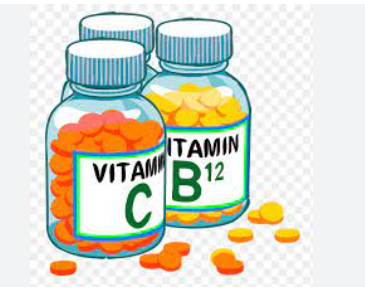Vitamin C:
Vitamin C: Enhancing Health and Vitality
Vitamin C, also known as ascorbic acid, is an essential nutrient that plays a crucial role in maintaining overall health and vitality. From supporting the immune system to promoting skin health, the benefits of vitamin C are numerous and diverse.
Importance of Vitamin C for Health
Immune System Support
One of the primary roles of vitamin C is its contribution to a robust immune system. It enhances the function of various immune cells, including white blood cells, which are essential for fighting off infections and illnesses. Consuming an adequate amount of vitamin C can help reduce the duration and severity of colds and other common infections.
Antioxidant Properties
Vitamin C is a powerful antioxidant that helps protect cells from damage caused by free radicals. Free radicals are unstable molecules that can contribute to the development of chronic diseases such as heart disease, cancer, and arthritis. By neutralizing free radicals, vitamin C helps reduce the risk of these conditions and promotes overall health and longevity.
Food Sources of Vitamin C
Vitamin C is naturally found in a wide variety of fruits and vegetables, making it easy to incorporate into a balanced diet. Citrus fruits such as oranges, lemons, and grapefruits are rich sources of vitamin C. Other fruits like strawberries, kiwi, and pineapple also contain high levels of this nutrient. Additionally, vegetables such as bell peppers, broccoli, and spinach are excellent sources of vitamin C.
Recommended Daily Intake of Vitamin C
The recommended daily intake of vitamin C varies depending on factors such as age, gender, and overall health status. However, the average adult should aim for around 75 to 90 milligrams per day. Pregnant and breastfeeding women may require higher doses to support the needs of their growing baby.
Signs of Vitamin C Deficiency
A deficiency in vitamin C can lead to various health problems, including weakened immune function, fatigue, and poor wound healing. Common signs of vitamin C deficiency include frequent infections, easy bruising, and swollen gums. Incorporating vitamin C-rich foods into your diet or taking supplements can help prevent deficiency and maintain optimal health.
Benefits of Vitamin C for Skin Health
In addition to its role in supporting overall health, vitamin C is also beneficial for maintaining youthful and radiant skin. Vitamin C plays a vital role in collagen production, a protein that provides structure and elasticity to the skin. By promoting collagen synthesis, vitamin C helps reduce the appearance of wrinkles, fine lines, and other signs of aging. Furthermore, its antioxidant properties protect the skin from damage caused by UV radiation and environmental pollutants.
Vitamin C and Collagen Production
Collagen is the most abundant protein in the body and is essential for maintaining healthy skin, hair, and nails. Vitamin C plays a critical role in collagen synthesis, as it is required for the conversion of proline and lysine into hydroxyproline and hydroxylysine, which are crucial components of collagen molecules. Without an adequate supply of vitamin C, collagen production is impaired, leading to sagging skin, brittle hair, and weak nails.
Vitamin C Supplements
While it's always best to obtain nutrients from whole foods, vitamin C supplements can be beneficial for individuals who have difficulty meeting their daily requirements through diet alone. Vitamin C supplements are available in various forms, including tablets, capsules, and powders. It's essential to choose a high-quality supplement from a reputable manufacturer to ensure purity and potency.
Risks and Side Effects of Vitamin C Overconsumption
While vitamin C is generally safe when consumed in appropriate doses, excessive intake can lead to adverse effects such as stomach upset, diarrhea, and kidney stones. It's important to avoid mega-dosing vitamin C supplements unless recommended by a healthcare professional, as high doses can interfere with the absorption of other nutrients and may have unintended health consequences.
The Discovery of Vitamin C
Vitamin C, also known as ascorbic acid, was first discovered in the early 20th century by Hungarian biochemist Albert Szent-Györgyi. In 1928, Szent-Györgyi isolated a compound from adrenal glands that cured scurvy in guinea pigs. This compound was later identified as vitamin C, a vital nutrient essential for human health.
Szent-Györgyi's groundbreaking research paved the way for further exploration into the role of vitamin C in the body. It was later found that vitamin C plays a crucial role in collagen synthesis, wound healing, and immune function, among other physiological processes.
Popular Brands Offering Vitamin C Supplements
1. Nature's Bounty
- Nature's Bounty is a well-known brand that offers a wide range of vitamins and supplements, including Vitamin C. Their Vitamin C supplements come in various forms, including tablets, gummies, and chewables, making it easy for consumers to incorporate into their daily routine.
2. NOW Foods
- NOW Foods is another reputable brand that manufactures high-quality supplements, including Vitamin C. Their Vitamin C products are available in both traditional tablets and more innovative forms such as powders and effervescent tablets, providing options for different preferences.
3. Viva Naturals
- Viva Naturals is committed to providing natural and organic supplements, and their Vitamin C products are no exception. They offer Vitamin C supplements derived from organic sources such as acerola cherries and rose hips, ensuring purity and potency.
4. Solgar
- Solgar is a trusted name in the supplement industry, known for its commitment to quality and efficacy. Their Vitamin C supplements are available in various strengths and formulations to meet the diverse needs of consumers.
5. Nature Made
- Nature Made is a popular brand recommended by healthcare professionals. Their Vitamin C supplements are formulated with high-quality ingredients and undergo rigorous testing to ensure purity and potency.
Conclusion
The discovery of Vitamin C revolutionized our understanding of nutrition and health, highlighting the importance of this essential nutrient in supporting overall well-being. Today, numerous brands offer Vitamin C supplements, providing consumers with convenient and effective ways to meet their daily needs. Whether in traditional tablet form or more innovative formulations, Vitamin C supplements continue to play a crucial role in promoting optimal health and vitality.
FAQs (Frequently Asked Questions)
1. Can I get enough Vitamin C from food alone?
- While it's possible to obtain Vitamin C from a balanced diet rich in fruits and vegetables, supplementation may be necessary for some individuals to meet their daily requirements, especially during periods of increased need.
2. Are there any side effects associated with Vitamin C supplements?
- In general, Vitamin C supplements are considered safe when taken as directed. However, high doses may cause gastrointestinal discomfort in some individuals. It's essential to follow the recommended dosage guidelines and consult with a healthcare professional if you have any concerns.
3. What is the recommended daily intake of Vitamin C?
- The recommended daily intake of Vitamin C varies depending on factors such as age, gender, and overall health status. For adults, the recommended dietary allowance (RDA) is around 75 to 90 milligrams per day.
4. Can Vitamin C supplements help prevent colds and flu?
- While Vitamin C may help support the immune system and reduce the duration and severity of colds and flu, it is not a cure for these illnesses. It's essential to practice good hygiene and maintain a healthy lifestyle to prevent illness.
5. Are there any interactions between Vitamin C supplements and medications?
- Vitamin C supplements may interact with certain medications, including blood thinners and chemotherapy drugs. It's important to consult with a healthcare professional before starting any new supplement regimen, especially if you are taking medication.
6. Can I get enough vitamin C from food alone?
- Yes, a balanced diet rich in fruits and vegetables can provide ample vitamin C to meet your daily needs.
7. Are there any interactions between vitamin C and medications?
- Yes, vitamin C supplements may interact with certain medications, including blood thinners and chemotherapy drugs. It's essential to consult with your healthcare provider before starting any new supplement regimen.
8. Is it possible to overdose on vitamin C?
- While rare, it is possible to overdose on vitamin C, especially when taking high-dose supplements. Symptoms of vitamin C overdose may include stomach cramps, diarrhea, and kidney stones.
9. Can vitamin C help with colds and flu?
- While vitamin C may help reduce the duration and severity of colds and other infections, it is not a cure for the common cold or flu. It's best to focus on maintaining a healthy lifestyle and practicing good hygiene to prevent illness.
10. Are there any special considerations for vitamin C supplementation during pregnancy?
- Pregnant women may require higher doses of vitamin C to support the needs of their growing baby. However, it's essential to consult with a healthcare provider before starting any new supplement regimen during pregnancy.




